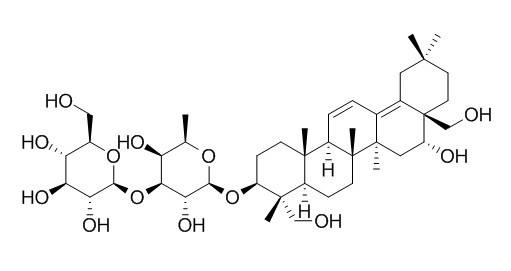Saikosaponin B2
Saikosaponin B2 as an efficient inhibitor of early HCV entry, including neutralization of virus particles, preventing viral attachment, and inhibiting viral entry/fusion. It (5 microM) induces differentiation of B16 melanoma cells, with potentiation of expressions of melanogenesis and tyrosinase.
Inquire / Order:
manager@chemfaces.com
Technical Inquiries:
service@chemfaces.com
Tel:
+86-27-84237783
Fax:
+86-27-84254680
Address:
1 Building, No. 83, CheCheng Rd., Wuhan Economic and Technological Development Zone, Wuhan, Hubei 430056, PRC
Providing storage is as stated on the product vial and the vial is kept tightly sealed, the product can be stored for up to
24 months(2-8C).
Wherever possible, you should prepare and use solutions on the same day. However, if you need to make up stock solutions in advance, we recommend that you store the solution as aliquots in tightly sealed vials at -20C. Generally, these will be useable for up to two weeks. Before use, and prior to opening the vial we recommend that you allow your product to equilibrate to room temperature for at least 1 hour.
Need more advice on solubility, usage and handling? Please email to: service@chemfaces.com
The packaging of the product may have turned upside down during transportation, resulting in the natural compounds adhering to the neck or cap of the vial. take the vial out of its packaging and gently shake to let the compounds fall to the bottom of the vial. for liquid products, centrifuge at 200-500 RPM to gather the liquid at the bottom of the vial. try to avoid loss or contamination during handling.
J Food Drug Anal.2023, 31(2):254-277.
Korean J Dent Mater.2018, 45(2):139-146
Phytother Res.2018, 32(12):2551-2559
Int J Mol Sci.2022, 23(23):14826.
Chengdu University of Traditional Chinese Medicine2024, 4802935.
Agriculture.2022, 12(3), 342.
J. Soc. Cosmet. Sci. Korea2016, 163-171
Front Immunol.2018, 9:2655
J of the Korean Society of Cosmetics and Cosmetology2018, 399-406
Pharmaceutics.2020, 12(9):845.
Related and Featured Products
J Hepatol. 2015 Mar;62(3):541-8.
Saikosaponin b2 is a naturally occurring terpenoid that efficiently inhibits hepatitis C virus entry.[Pubmed:
25450204]
A vaccine against hepatitis C virus (HCV) is unavailable and cost-effective antivirals that prevent HCV infection and re-infection, such as in the transplant setting, do not exist. In a search for novel and economical prophylactic agents, we examined the antiviral activity of saikosaponins (SSa, SSb2, SSc, and SSd) from Bupleurum kaoi root (BK) as entry inhibitors against HCV infection.
METHODS AND RESULTS:
Infectious HCV culture systems were used to examine the effect of saikosaponins on the complete virus life cycle (entry, RNA replication/translation, and particle production). Antiviral activity against various HCV genotypes, clinical isolates, and infection of primary human hepatocytes were also evaluated.
BK and the saikosaponins potently inhibited HCV infection at non-cytotoxic concentrations. These natural agents targeted early steps of the viral life cycle, while leaving replication/translation, egress, and spread relatively unaffected. In particular, we identified Saikosaponin B2(SSb2) as an efficient inhibitor of early HCV entry, including neutralization of virus particles, preventing viral attachment, and inhibiting viral entry/fusion. Binding analysis, using soluble viral glycoproteins, demonstrated that SSb2 acted on HCV E2. Moreover, SSb2 inhibited infection by several genotypic strains and prevented binding of serum-derived HCV onto hepatoma cells. Finally, treatment with the compound blocked HCV infection of primary human hepatocytes.
CONCLUSIONS:
Due to its potency, SSb2 may be of value for development as an antagonist of HCV entry and could be explored as prophylactic treatment during the course of liver transplantation.
Mol Med Rep . 2019 Aug;20(2):1943-1951.
Antitumor effects of saikosaponin b2 on breast cancer cell proliferation and migration[Pubmed:
31257464]
Abstract
Saikosaponin B2 (SSb2) can be extracted from Bupleurum spp. roots (Radix Bupleuri), which belongs to the Umbelliferae family. The current study aimed to explore the effects of SSb2 on proliferation of breast cancer cells and to identify the mechanism by which SSb2 affects breast cancer cell migration. mRNA expression levels of STAT3 and vasodilator‑stimulated phosphoprotein (VASP) were determined and increased expression was observed in 16 breast cancer tissues compared with the paracancerous tissues. MTT, wound healing, colony formation assays and western blot suggested that SSb2 inhibited MCF‑7 proliferation and migration. It was further identified by western blot analysis that SSb2 treatment reduced levels of phosphorylated STAT3, VASP, matrix metallopeptidase (MMP) 2 and MMP9 in MCF‑7 compared with the untreated cells. In addition, it was demonstrated that inhibition of STAT3 phosphorylation decreased VASP expression levels and induction of STAT3 phosphorylation increased VASP levels. Furthermore, it was observed that the treatment of Kunming mice with SSb2 at 30 mg/kg/day for 30 days induced no obvious changes in the liver or kidney tissues, as determined by haematoxylin and eosin staining. In conclusion, these results indicated that SSb2 may be a potential antitumor drug for the treatment of breast cancer, which acts by suppressing proliferation and migration by downregulating the STAT3 signalling pathway and inhibiting the expression of VASP, MMP2 and MMP9 expression.
Biochem Biophys Res Commun. 1996 Feb 15;219(2):480-5.
Saikosaponin b2-induced apoptosis of cultured B16 melanoma cell line through down-regulation of PKC activity.[Pubmed:
8605013]
Saikosaponin B2 (SSb2)was found to inhibit the proliferation of B16 melanoma cells.
METHODS AND RESULTS:
To explore this mechanism, we employed flow cytometry to determine the distribution of DNA content. The cell cycle of B16 melanoma cells was accumulated in the G1 phase followed by induction of apoptosis. This suggests that SSb2-induced proliferation inhibition is caused by G1 phase accumulation and that apoptosis induction is G1-phase-accumulation dependent. Phorbol 12-myristate 13-acetate (PMA), a protein kinase C (PKC) activator, did not interfere with the proliferation and did not induce apoptosis of B16 melanoma cells by itself. However, PMA significantly abolished these effects of SSb2 in including proliferation inhibition and apoptosis induction.
CONCLUSIONS:
Down-regulation of the PKC activity may be involved in the effect of SSb2.



